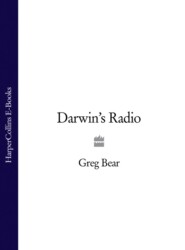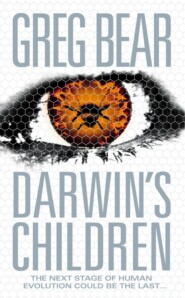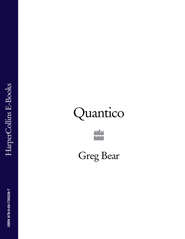По всем вопросам обращайтесь на: info@litportal.ru
(©) 2003-2024.
✖
Vitals
Автор
Год написания книги
2018
Настройки чтения
Размер шрифта
Высота строк
Поля
It was clearly colonial, fairly hardy in comparison to its companions, but, most important, it was still alive. My first guess was that it was made up of xenolike protists. Each saclike bump of its anatomy was an individual cell, anywhere from a few millimeters to a couple of centimeters in size.
Most modern cells are microscopic and need only one nucleus, the central computer and factory that contains the chromosomes. These cells were much larger than most modern cells. I supposed, in my intensity of speculation, that each of the components would have many nuclei, as xenos do, to speed creation and delivery of the necessary gene products – ribosomal RNA, proteins, etc. – across its comparatively far-flung cytoplasmic territory.
That would be familiar. That would be expected.
But when we carefully plucked a cell from the feather-fan colony, froze and micro-sliced it, then mounted it for the lab’s little electron microscope, Dan reported that there were no nuclei whatsoever. The cell was a blob of jelly with unbounded circular chromosomes floating in a thick but simple membrane, and that in itself would make it a variety of bacteria or archaea, neither of which sequester their DNA in nuclei.
But the cell was supported by a microtubule cytoskeleton, looking like wads of glassy fibers under the microscope. Bacteria and archaea do not have cytoskeletons.
The sampled cell was as big as the tip of my pinky. Inspection of another cell showed us that there were bacteria of many different kinds living loose inside, screwing their way through the cytoplasmic gel. Some of these bacterial interlopers were large – millimeters in size, visible to the naked eye. They reminded me of extremophiles I had seen profiled in Science a few months before, the kind that clustered on the butts of ugly red Pompeii worms in vent communities.
The frond, then, was neither plant nor precisely animal, nor did it belong to any of the remaining three kingdoms of modern biology. Each big cell in my colonial critter was like an old-fashioned Western mining town. The bacterial hitchhikers were free to come and go, but mostly they stayed. I imagined they were like mine workers recruited from the town’s ruffians, doing their jobs, but on occasion hog-tying the boss and his wife, threatening the engineers (my imagination was fevered by lack of blood sugar), and forcing the lucrative mine owners to pay out caskets of gold, and not a sheriff in sight.
Lots of free-range cooperation between characters who might at any moment pull out six-guns and start blazing away at each other, then turn around the next moment –
And share a drink at the bar.
I laughed. Valerie and Betty blinked at me, owlish and exhausted. I looked at my watch. It was seven-thirty in the evening. We hadn’t taken any breaks.
We were due.
The machines could run themselves. The tank would keep whatever was still alive happy. I looked at Valerie’s tentative list of proteins from the mush and pursed my lips as if coming in for a smooch.
‘Wow,’ I said.
‘Good?’ Betty asked.
‘Phenomenal,’ I said. ‘There are no nuclei and no mitochondria in these cells. They are very primitive.’
‘That’s good?’
‘It’s what I’ve been dreaming about for years,’ I said. ‘The bacteria in the cytoplasm are commensal, but not symbiotic – they help the cell respire and metabolize its food. But they’re a long jump behind becoming mitochondria. Maybe hundreds of millions of years…’
My arm flesh pricked up with goose bumps. ‘Jesus,’ I said, with all the reverence I am capable of. ‘We could be looking at ghosts from the Garden of Eden. And they haven’t taken the Fall.’
Dan had slumped over the Applara monitor. Valerie shook him awake and whispered something into his ear. He brightened.
‘Dinner?’ he murmured.
‘It’s on me,’ I said. I looked at Betty. ‘You should come, too. And Bloom, if he’s still around.’ I felt magnanimous. Hell, I was punchy with glee.
‘Tell Owen,’ Betty insisted.
I called Montoya on Betty’s cell-phone. He answered on the second buzz.
‘Betty, I’m taking a shit. What is it?’
‘This is Hal,’ I said. ‘It’s fantastic. I’ve got news. I think I have the final clues.’ I took a deep breath. When tired, both Rob and I had a tendency to commit unwitting rhyme. Shall we visit Dr Seuss?
‘Good news, I hope,’ Montoya said. ‘Because up until now it’s all been terrible.’
‘I’ve got a primitive cell. Primordial.’ Now I went out on a limb. ‘Of a kind we haven’t seen for three billion years. With the blueprints for bacterial domination still fresh and all the players fairly naive.’
‘Tell me what that means when it’s at home, Hal.’
‘I think I’ve got the list of RNA and protein products that bacteria use to take control of our genome.’
‘And what will you do with it?’ Montoya asked patiently.
‘Break some of the pathways, interrupt cell receptors, create new bacteria,’ I said, as if that were perfectly obvious. ‘Our cells won’t be told to shut down or age. They won’t lose their ability to self-repair. They’ll stay young.’
‘Fine. So you know how to fix us?’
‘Not yet,’ I said. Miracles would take years, not days. ‘Based on earlier work, I need to find the five or ten more proteins that are triggered by hades to shut down youthful cell maintenance. They could be on this list. I need to sequence the free-floating chromosomes – less than a few million base pairs. I want to do some Southern Blot, some PCR, run homology tests. I’m sure we still have the same genes, somewhere, highly conserved.’
‘Congratulations, Hal,’ Montoya said. He did not sound enthused, but as he had said, so far the news had been all bad. ‘Put Betty on.’
Coming down off my high, I handed the phone to Betty. She listened for a moment, then shut it and turned to me.
‘Owen insists that dinner is on him. And after dinner he wants to see you. He’s flying into Seattle.’
Dan and Valerie high-fived me. Betty was more subdued, though I wouldn’t learn why for five more hours.
Angels can be pipers, too.
CHAPTER FIFTEEN (#ulink_bde06dc2-68ae-52b1-886d-a4794e4e8967)
Dinner at Canlis was elegant but quiet. The somber gray-stained wood and white tablecloths framed a terrific view of Lake Union. I could seldom afford to eat so well, but I was nervous and excited all at once, and the best I could do was share a champagne toast with Valerie and Dan and pick at my plate.
We shook hands and parted at midnight. Betty Shun drove me in her Lexus to one of Montoya’s four Seattle residences, a penthouse apartment on the top floor of a complex less than five blocks away. I catnapped during the short drive.
Betty woke me when she set the emergency brake in the underground garage. I jerked up in the seat. She was staring at me. Her face glowed pale violet in the garage’s cruel fluorescence.
‘I have one question,’ she said. ‘Why do you want to live a thousand years?’
I cocked my head to one side to work a crick out of my neck. ‘More is better than not enough,’ I said.
‘Life is full of pain and disappointment. Why prolong the misery?’
‘I don’t believe life is all pain and misery,’ I said.
‘I’m a Catholic,’ Betty Shun said, still searching my face with her eyes. ‘I know the world is bad. My grandmother is a Buddhist. She knows the world is illusion. I want to live a healthy life, a useful life, but I don’t want to live for ever. Something better is in the wings.’
‘I’m more of a Shintoist,’ I said. ‘I believe the living world is all around us, thinking and working all the time, and that all living things want to understand what’s going on. We just don’t live long enough to find out. And when we die, that’s it. No second act.’
‘You will push out others not yet born,’ she said.
‘If the world is full of pain, I’ll be doing them a favor,’ I said testily. I wasn’t up to a sophomoric debate at midnight, not after a hard and enlightening day’s work.









